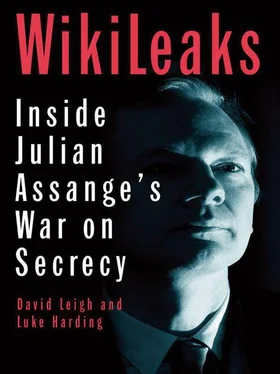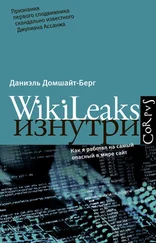Harding, Luke - WikiLeaks - Inside Julian Assange's War on Secrecy
Здесь есть возможность читать онлайн «Harding, Luke - WikiLeaks - Inside Julian Assange's War on Secrecy» весь текст электронной книги совершенно бесплатно (целиком полную версию без сокращений). В некоторых случаях можно слушать аудио, скачать через торрент в формате fb2 и присутствует краткое содержание. Жанр: Старинная литература, на английском языке. Описание произведения, (предисловие) а так же отзывы посетителей доступны на портале библиотеки ЛибКат.
- Название:WikiLeaks: Inside Julian Assange's War on Secrecy
- Автор:
- Жанр:
- Год:неизвестен
- ISBN:нет данных
- Рейтинг книги:3 / 5. Голосов: 1
-
Избранное:Добавить в избранное
- Отзывы:
-
Ваша оценка:
- 60
- 1
- 2
- 3
- 4
- 5
WikiLeaks: Inside Julian Assange's War on Secrecy: краткое содержание, описание и аннотация
Предлагаем к чтению аннотацию, описание, краткое содержание или предисловие (зависит от того, что написал сам автор книги «WikiLeaks: Inside Julian Assange's War on Secrecy»). Если вы не нашли необходимую информацию о книге — напишите в комментариях, мы постараемся отыскать её.
WikiLeaks: Inside Julian Assange's War on Secrecy — читать онлайн бесплатно полную книгу (весь текст) целиком
Ниже представлен текст книги, разбитый по страницам. Система сохранения места последней прочитанной страницы, позволяет с удобством читать онлайн бесплатно книгу «WikiLeaks: Inside Julian Assange's War on Secrecy», без необходимости каждый раз заново искать на чём Вы остановились. Поставьте закладку, и сможете в любой момент перейти на страницу, на которой закончили чтение.
Интервал:
Закладка:
Burns’ piece actually omitted the full facts: Assange’s key lieutenant, Daniel Domscheit-Berg, was also privately denouncing Assange’s “cult of stardom”. The German would write later: “It is not for nothing that many who have quit refer to him as a ‘dictator’. He thinks of himself as the autocratic ruler of the project and believes himself accountable to no one. Justified, even internal, criticism – whether about his relations with women or the lack of transparency in his actions – is either dismissed with the statement ‘I’m busy, there are two wars I have to end’ or attributed to the secret services’ smear campaigns.”
Round the Guardian editor’s table, the others now sat silently as Assange fulminated against Burns and the New York Times in the strangely old-fashioned declamatory baritone he used when angry. He returned to his questions. Did they have the cables? How?
The problem, interjected Rusbridger, was that the paper now had a second source for the cables. It was negotiating with Heather Brooke for her to join the Guardian team. Otherwise she would be free to take them to any paper – which would mean the Guardian losing all access, control and exclusivity. Assange turned on Rusbridger. This wasn’t a second source. Brooke had stolen the cables. It had been done “by theft, by deception … certainly unethical means”. He knew enough about the way she had operated to “destroy” her. The climax came when Assange (the underground leaker of illegal secrets) threatened that his lawyers could sue for the loss of WikiLeaks’ “financial assets”.
“I’d look forward to such a court case,” said the Guardian ’s editor with a smile. None of this tirade made sense to Rusbridger. Brooke was a professional journalist: she had stolen nothing. More to the point, either the Guardian had a second source – in which case it no longer had to rely on Assange’s copy – or it all originated, as Assange claimed, from a single source, WikiLeaks, in which case WikiLeaks had broken its agreement to make a copy only for the Guardian , and Assange was in a poor position to be ranting at others.
Katz asked what other copies of the database existed: for instance, was it correct that Ellsberg had one? Assange shot back: “Daniel Ellsberg’s is an encrypted back-up copy of the database which he was to give the New York Times in a piece of political theatre.”
Assange returned to his favourite theme of how a gentleman leaker would behave: “People who aren’t behaving like gentlemen should start behaving like one. On the basis that the Guardian has given this to the New York Times , why should we collaborate with the Guardian ?”
Assange began suggesting deals with other American papers. The Washington Post was hungry for this stuff. Under questioning, he elaborated a little, admitting that he had already been in discussion both with the Post and the US McClatchy newspaper group about possible co-operation.
Assange launched into the NYT again: “The strategy that the New York Times engaged in was … not very gentlemanly … They wrote a terrible piece about Bradley Manning and this terrible, terrible piece about me on the front page by John F Burns. He says that he has received the most criticism of anything that he has ever written in his entire journalistic career over that piece, from senior people, and there’s a reason for that.
“We’re willing to engage in realpolitik if necessary, but that’s an organisation whose modus operandi is to protect itself, by destroying us. I do advise you to read it. It is obvious to anyone who reads it that it is designed to be a smear. It uses unnamed sources to quote some random person who has never had anything to do with our organisation except running some chat room, saying that I’m mad, etcetera, etcetera. It really is bad journalism. I’m not asking much. We are asking for the Times to follow its own standards. The standards that it follows for other people, because those standards apply, and the Times should not go out of its way to produce a negative, sleazy hit-piece and place it on the front page.”
Katz asked him directly how far he had got in negotiation with the Washington Post . “I haven’t made an agreement. Though I think we’ll probably go with the Post unless we get a very good counter-offer, because the Times has defiled the relationship.”
Rusbridger suggested a short break. When they reassembled, still without lawyers (Stephens and Robinson were sitting outside the room, Proudler down the corridor) the temperature had lowered a bit. Rusbridger suggested they look at some of the issues around the sequencing of stories. Ian Katz led Assange through the work they had done earlier in the day on which items should run in which order. Assange listened calmly. Gone was the aggression and finger-pointing. In its place there was a new engagement – as though his brain had flicked a switch to channel the rational, highly strategic zones which had been missing in the early confrontation.
He was, however, now insisting on yet further delay. The journalists asked how WikiLeaks would ideally release the cables. He replied, “Our ideal situation is not till next year. Anything before one month is semi-lethal even under emergency conditions. We have woken a giant by wounding one of its legs [the US defence department] and the release of this material will cause the other leg [the state department] to stand up. We are taking as much fire as we can but we can’t take any more.” He stressed that he wanted the cables to be released in an orderly way and not in a “big dump”. Ideally, a “gradual release played out over two months”. But he was willing to see the launch in as soon as a month’s time: “We can gear up to attempt to be in a position such that we can survive, in a month.”
Assange had already spoken, only half-jokingly, of his need to have a safe refuge in Cuba before the cables came out. Now he said the ordering had to be arranged so that it didn’t appear anti-American. He didn’t want WikiLeaks to seem obsessed with America. The stories in the cables had far wider significance – so it was important to establish a running order which would make people realise that this wasn’t simply about the US.
“There are security exposés and abuses by other countries, these bad Arab countries, or Russia,” he said. “That will set the initial flavour of this material. We shouldn’t go exposing, for example, Israel during the initial phase, the initial couple of weeks. Let the overall framework be set first. The exposure of these other bad countries will set the tone of American public opinion. In the initial couple of weeks the frame is set that will colour the rest of it.”
Assange then made another startling announcement. He wanted to involve other newspapers from the “Romance languages”, to broaden the geopolitical impact. He mentioned El País and Le Monde . The others in the room looked at each other. This was going to double the complexities of an arrangement that was difficult enough to co-ordinate. How could they possibly do a deal between an American daily on a different time zone, with a French afternoon paper, a Spanish morning paper and a German weekly?
But by now there was at least a negotiation about the means to go forward. It was nearly 10pm. The discussions had been going relentlessly for nearly three hours. Rusbridger produced a couple of bottles of Chablis. The mood eased. Everyone readily agreed it could all be settled over some food at the Rotunda restaurant downstairs at Kings Place. The journalists moved, meeting Mark Stephens, Geraldine Proudler and Jennifer Robinson still sitting patiently outside the editor’s office.
Читать дальшеИнтервал:
Закладка:
Похожие книги на «WikiLeaks: Inside Julian Assange's War on Secrecy»
Представляем Вашему вниманию похожие книги на «WikiLeaks: Inside Julian Assange's War on Secrecy» списком для выбора. Мы отобрали схожую по названию и смыслу литературу в надежде предоставить читателям больше вариантов отыскать новые, интересные, ещё непрочитанные произведения.
Обсуждение, отзывы о книге «WikiLeaks: Inside Julian Assange's War on Secrecy» и просто собственные мнения читателей. Оставьте ваши комментарии, напишите, что Вы думаете о произведении, его смысле или главных героях. Укажите что конкретно понравилось, а что нет, и почему Вы так считаете.












